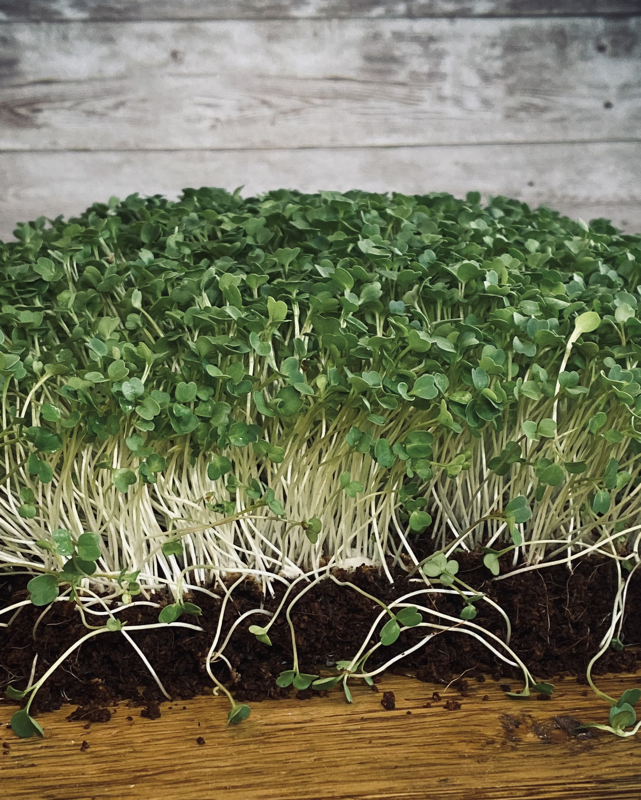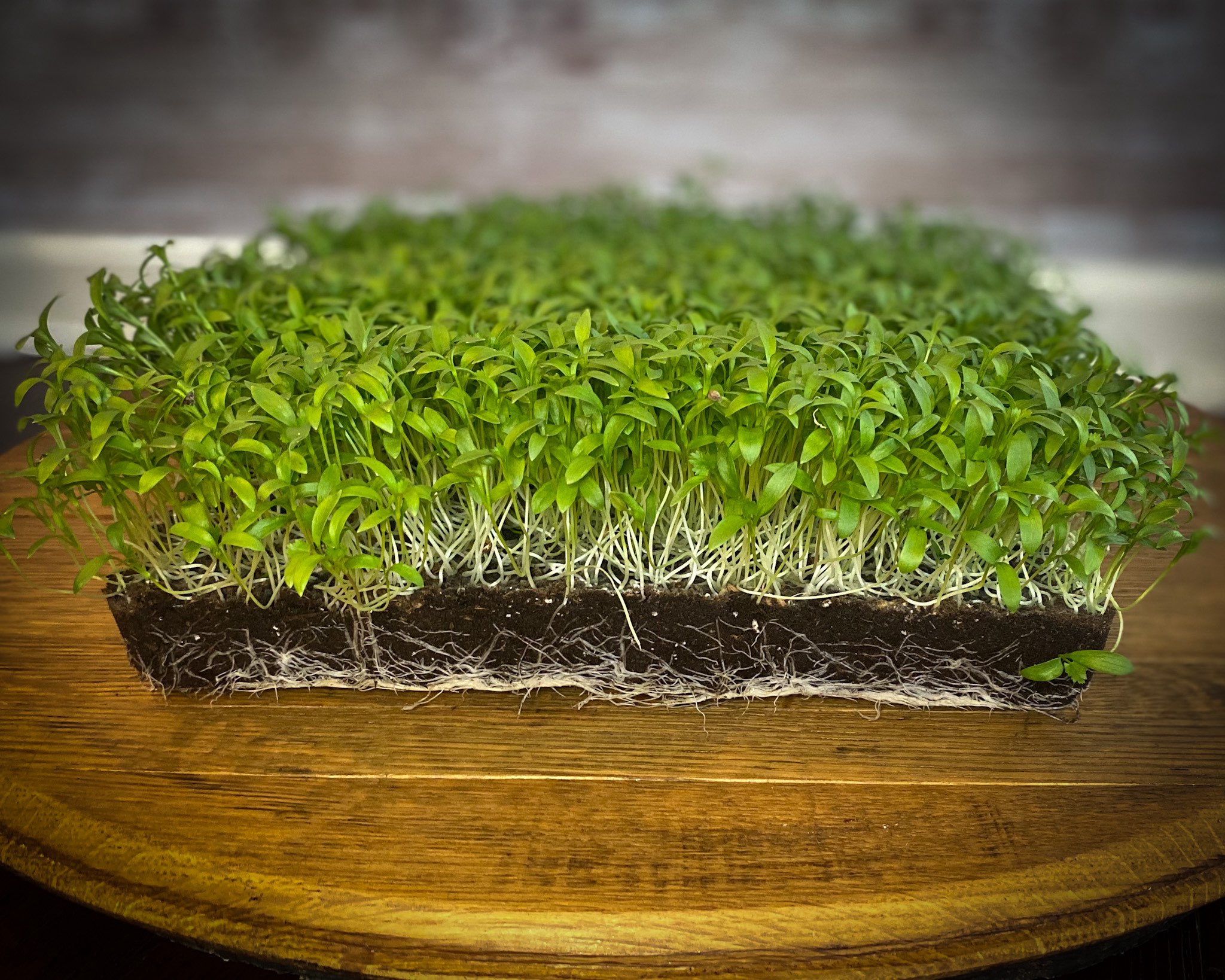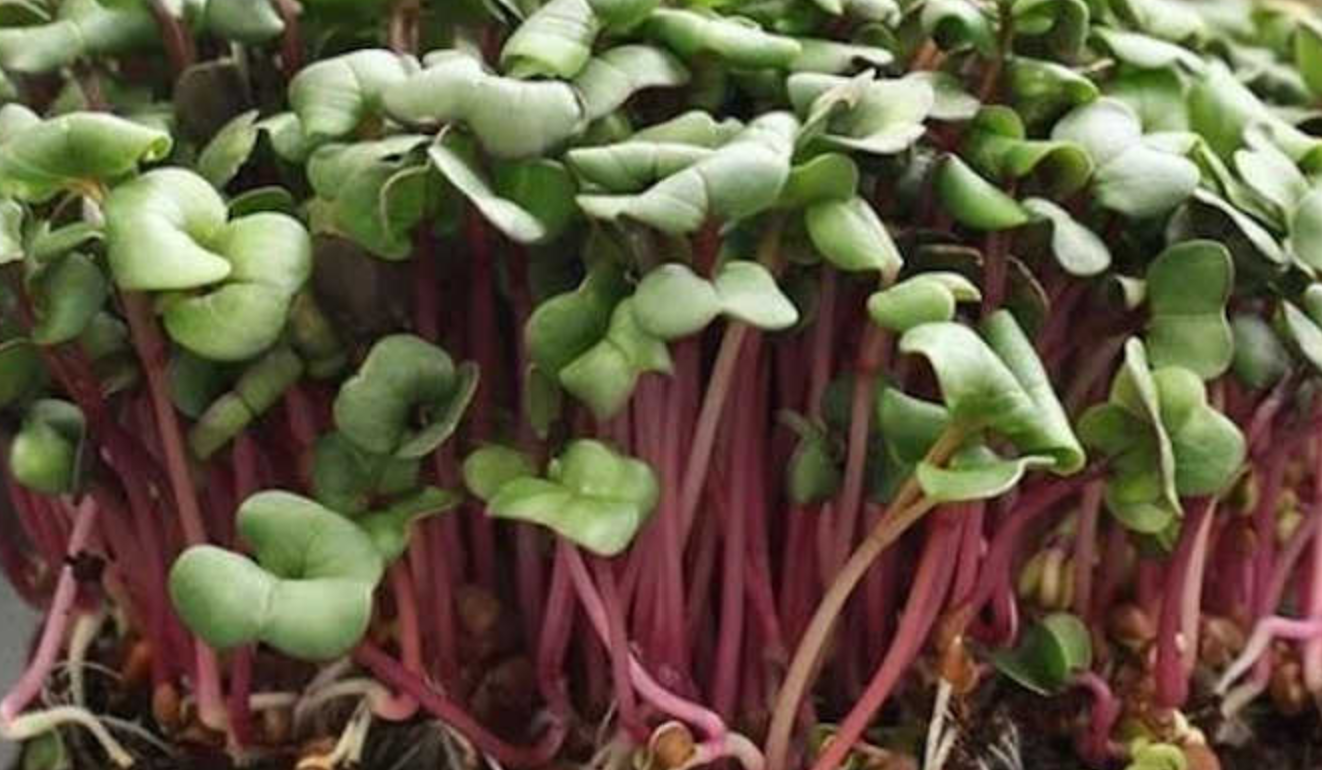(microgreens won't survive shipping)
Change quantity during checkout
Pea Shoots
4oz - Favorite!
Pea microgreens nutrition has significant amounts of vitamin C (66.7%), reasonable amounts of vitamins B1 thiamin (12.5%), and B5 pantothenic acid (15.0%). They are particularly rich in vitamin B9 folate (10.5%), a nutrient essential for DNA synthesis and cell division. They are rich in the minerals iron (11.6%), manganese (10.6%) and choline (10.5%) which are essential in many body processes and supporting heart health, boosting the immune system, and aiding detoxification.
If you’re looking for a healthy and delicious way to boost your overall nutrient intake, I recommend pea microgreens. They’re a great source of vitamins C, K, folate, and potassium, packed with antioxidants.
Tastes like... sugar snap peas. These are delicious enough to eat alone.
Sunflowers
4oz - Favorite!
Black oil sunflower microgreens are packed with nutrition which makes them among the most popular varieties sold. Vegetarians and vegans eat sunflowers as a good source for protein and amino acids. Recommended Daily Allowance: Contains 200% your RDA of Iron, 69% Copper, 34% Selenium, 23% Magnesium, 22% Manganese, 18% Phosphorus, 9% Potassium, 9% Zinc. Contains Vitamins A, B, C, D, K. Sunflowers contain Phytosterols, a plant compound which helps to lower serum LDL (bad cholesterol).
Tastes like... sunflower seeds. They have a nutty flavor and crunchy texture. These are delicious enough to eat alone. We love them raw with a little olive oil and salt.
Broccoli
2oz - Favorite!
Broccoli is high in sulforaphane which is a critical micronutrient in fighting cancer. Broccoli microgreen sulforaphane is even higher and more potent than in sprouts or mature broccoli. Micro broccoli can also help in reversing chronic illnesses such as heart disease and type II diabetes.
The nutrition in broccoli microgreens is tremendous and includes:
- vitamins A, B, C, E, and K
- macro-elements calcium, magnesium, and phosphorous
- micro-elements iron, copper, and zinc
Tastes like... broccoli...!
Arugula
2oz
Arugula microgreens contain almost eight times the calcium, five times the vitamin A, vitamin C, and vitamin K, and four times the iron as the iceberg lettuce. Arugula is high in fiber, and phytochemicals, low in sugar, calories, carbohydrates, and fat.
Tastes like... arugula; a bitter green
Cilantro
1oz
Cilantro microgreens are a tremendous source of vitamin K (258.33%), good for kidney function. They are also good sources of vitamins A (37.44%), B-Complex, C (30%), and E (16.67%), and provide moderate dietary fiber (10.00%), and essential minerals like copper (25%), potassium (11.09%), and manganese (18.52%). Cilantro microgreens are well known for their high levels of lutein and zeaxanthin (14.42%), which are beneficial for eye health. They are also rich in carotenoids (three times more than mature cilantro leaves), including beta-carotene (21.83%), a fat-soluble antioxidant crucial for organ function and cellular structure protection.
Tastes exactly like cilantro.
Power Greens
2oz
Mixed container of Broccoli, Kale, and Brussels Sprouts
Get maximum health benefits when you combine all three!
Add to your smoothie or to your salad, the sweetness of dried cranberries balances the slight bitterness of the greens.
Salad Mix
2oz
A flavorful and colorful combination of microgreens that grow well together. Contains: Broccoli, Kale, Kohlrabi, Arugula, Red Cabbage & Mustard.
Tastes like bitter greens, a great addition to any salad.
Radish
4oz
Micro radish are the highest in Vitamins A, C, E and Complex (B-1 (thiamine), B-2 (riboflavin), B-3 (niacin), B-5 (pantothenic acid), B-6 (pyridoxine), B-7 (biotin), B-9 (folic acid), B-12 (cobalamin). They're rich in antioxidants, promoting cellular repair, and essential minerals like calcium and iron.
Tastes peppery and spicy, great addition to any salad.
|
Seed to Harvest: ~10-14 days
Wheat Grass3oz Wheatgrass is an excellent source of many different vitamins and minerals. It is especially high in vitamins A, C and E, as well as iron, magnesium, calcium and amino acids. Of its 17 amino acids, eight are considered essential, meaning your body cannot produce them and you must obtain them from food sources. Tastes terrible! But perfect in smoothies. |
*Repeat orders available; weekly, biweekly or monthly... just email, text, or call









